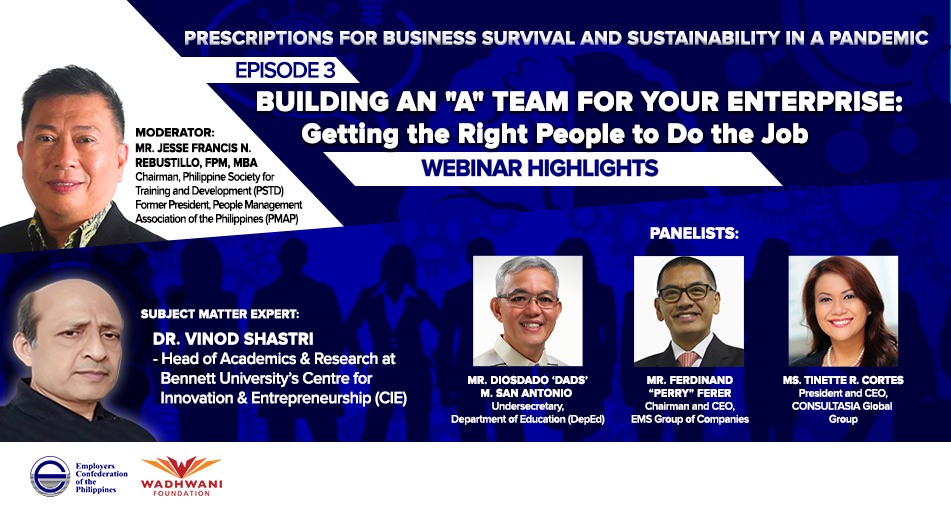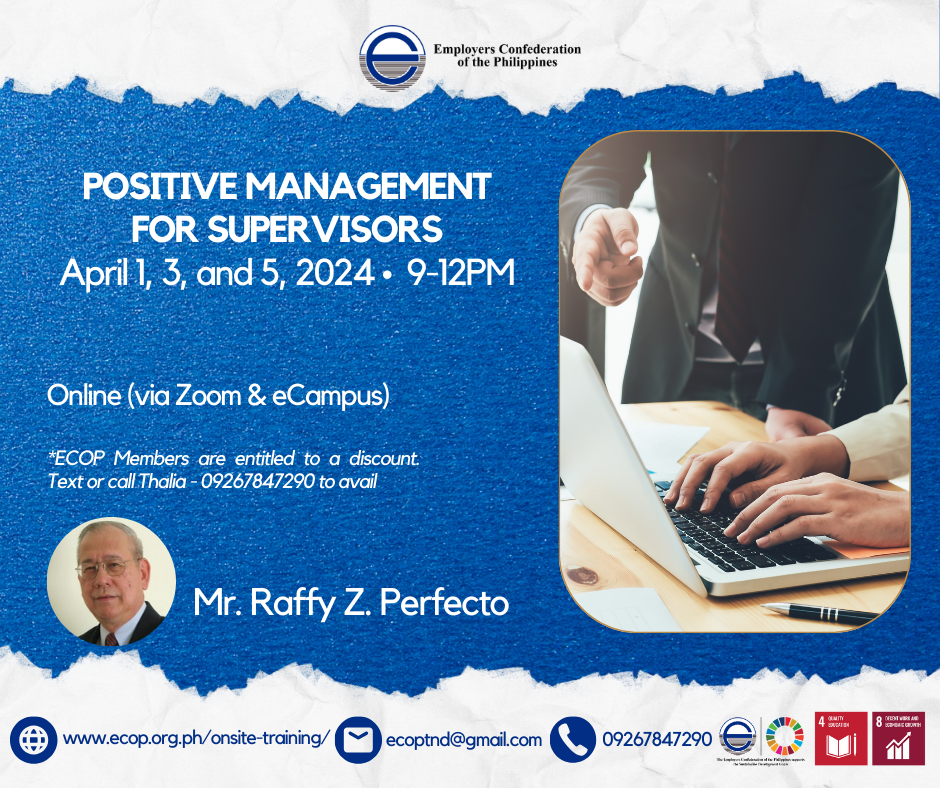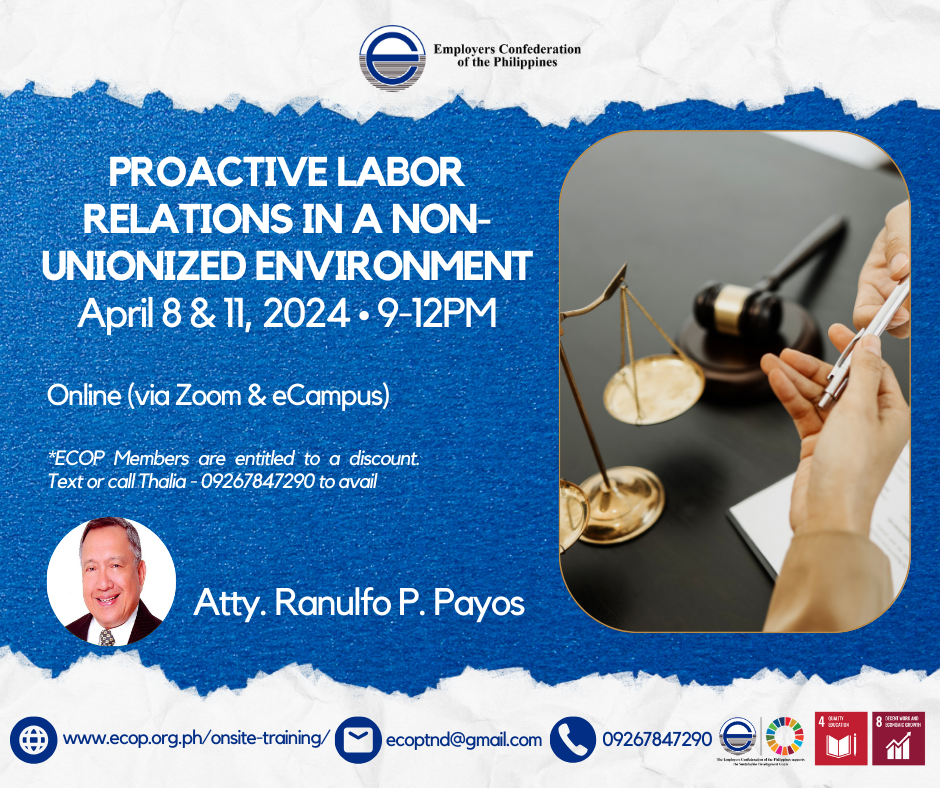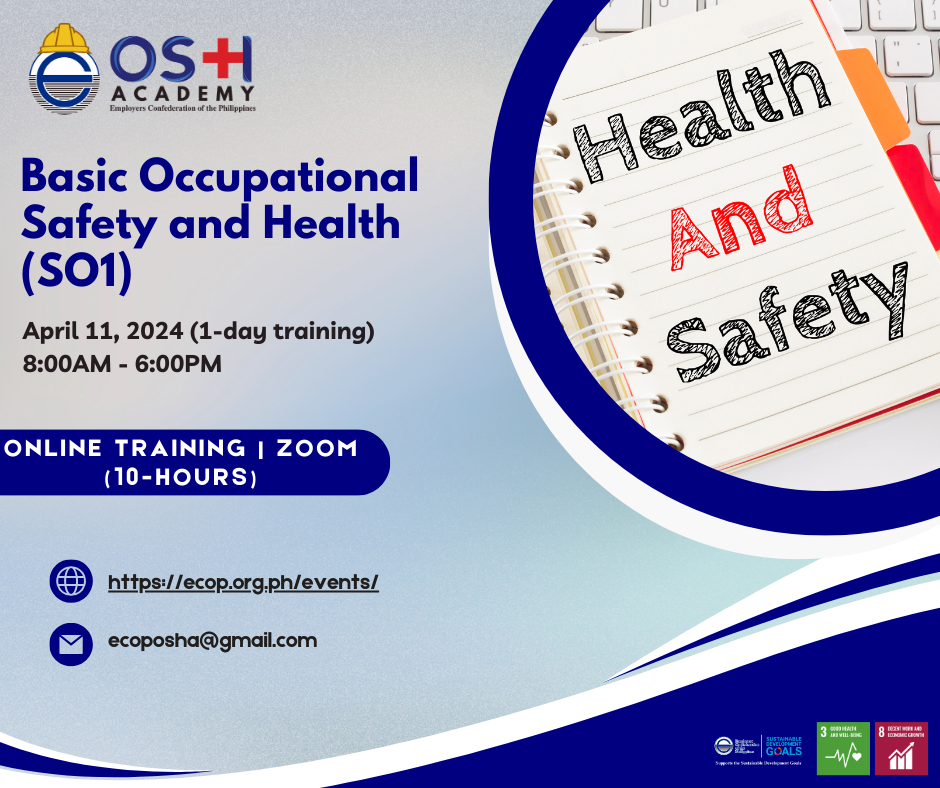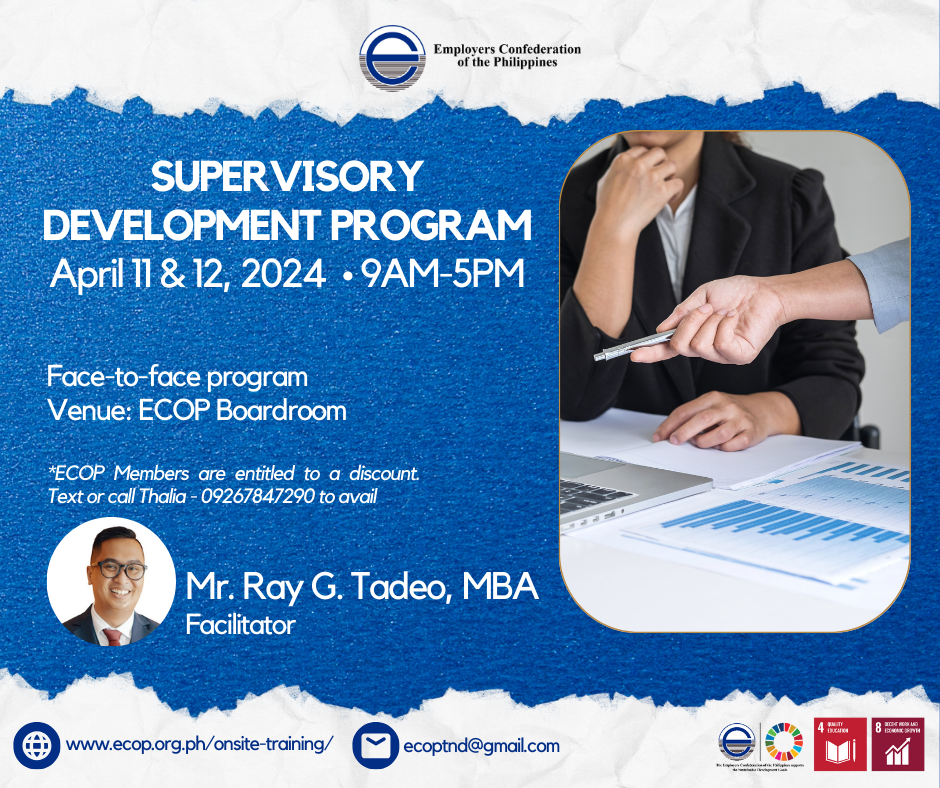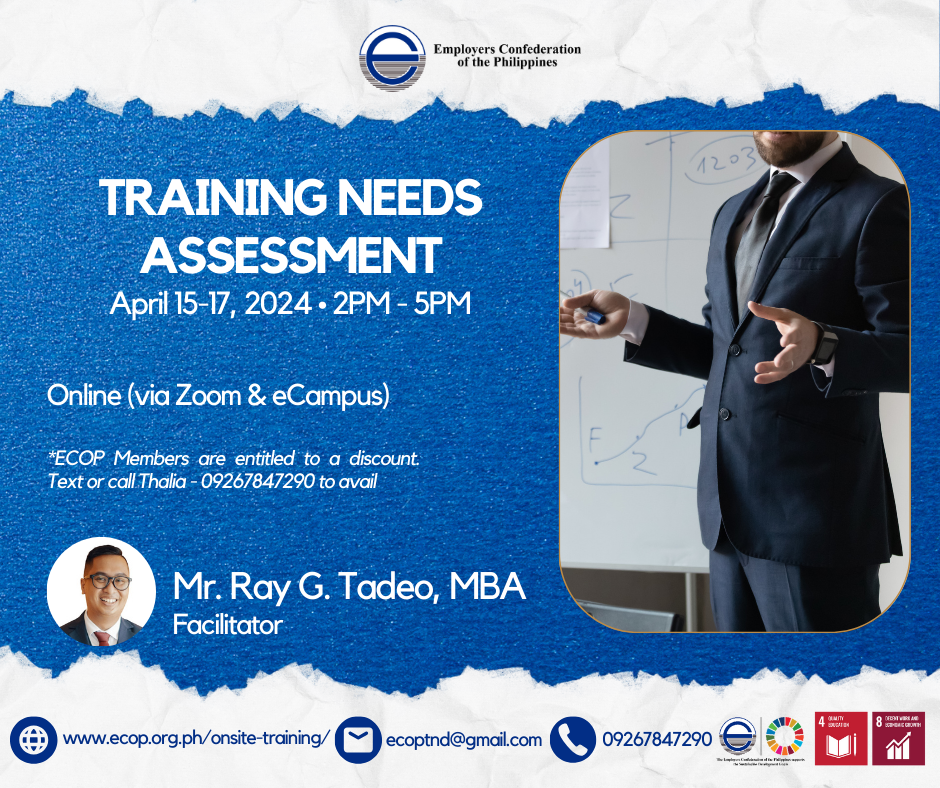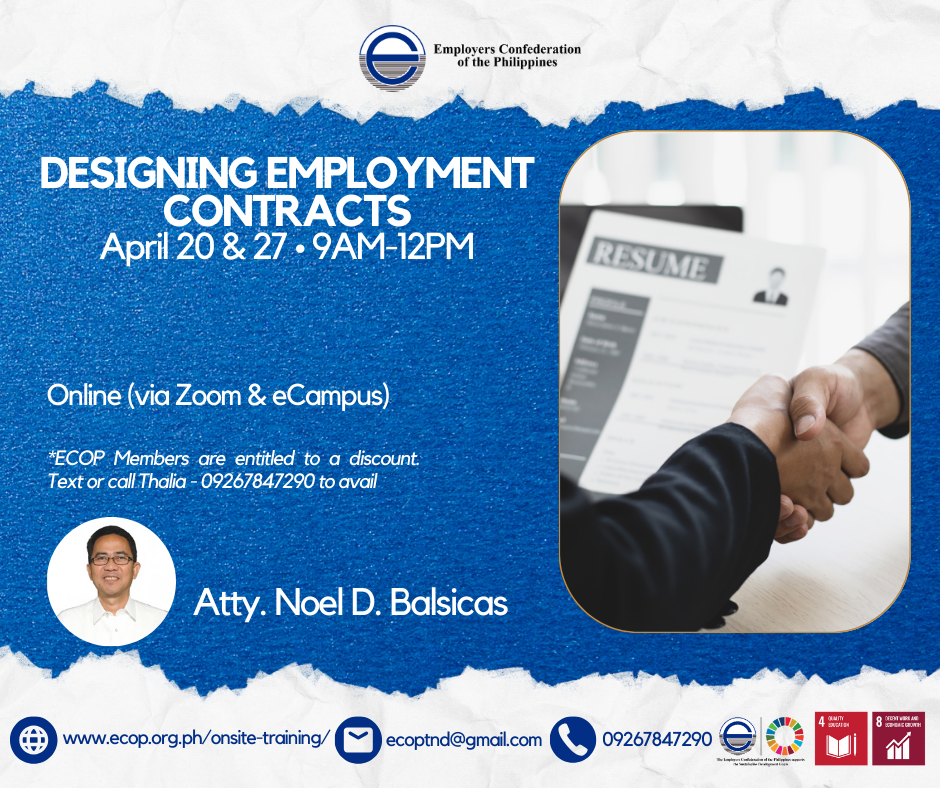Highlights of the Webinar:
Prescriptions for Business Survival and Sustainability in a Pandemic
Episode 3:
Building an “A” Team for your Enterprise: Getting the Right People to Do the Job
15 May 2020 | 3:00PM – 5:00PM
Background:
The Employers Confederation of the Philippines (ECOP), in partnership with the Wadhwani Foundation, launched a program called “Prescriptions for Business Survival and Sustainability in a Pandemic”. The program aims to equip start-ups and aspiring entrepreneurs with skills that will eventually help them create and develop opportunities for new business ventures, especially during challenging times.
The webinar series touches on four (4) key main topics, namely: 1) Starting and Redesigning your Business during a Pandemic: Using Design Thinking Principles and Applications, 2) Building Sustainable Business Model Opportunities During Times of a Pandemic, 3) Building an “A” Team for your Enterprise: Getting the Right People to Do the Job, and 4) Getting Venture Capital for your Enterprise: Finding Capital to Start your Business.
Episode 3 discussion revealed the opposite of what everyone is expecting: ‘one does not find the right employee; instead, the culture of the company makes any employee right’. In this regard, there is a shift of focus towards building the culture of ‘A’-ness of the company. The company must establish and uphold a culture that attracts employees: a culture that gets people to do the right job, not getting the right people to do the job. Considering that not all ‘A’ employees would want to work for your company, it would be a difficult job to hire ‘A’ employees only.
According to the main resource speaker, Dr. Vinod Shastri, the ‘A’-ness culture that a company should build must include two essential characteristics – care and trust. A company must know the value of caring and trusting for its team members in order to boost their confidence and do their job well. Rather than spending more time in finding the right employee, the right employee will come to the company.
SUBJECT MATTER EXPERT:

DR. VINOD SHASTRI
Head of Academics and Research at Bennett University’s Centre for Innovation and Entrepreneurship (CIE)
PANELISTS
PANELISTS:
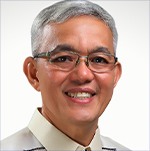
MR. DIOSDADO ‘DADS’ M. SAN ANTONIO
Undersecretary Department of Education (DepEd)
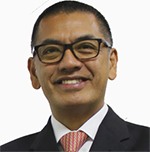 MR. FERDINAND “PERRY” FERER
MR. FERDINAND “PERRY” FERER
Chairman and CEO, EMS Group of Companies
 MS. TINETTE R. CORTES
MS. TINETTE R. CORTES
President and CEO, CONSULTASIA Global Group
Moderator:
 MR. JESSE FRANCIS N. REBUSTILLO, FPM, MBA
MR. JESSE FRANCIS N. REBUSTILLO, FPM, MBA
Chairman, Philippine Society for Training and Development (PSTD) Former President, People Management Association of the Philippines (PMAP)
On Adapting to Changes and Importance of Company Culture
The panelists shared their experiences on how their company was able to navigate through the waves of change these past few months:
- Instead of working 6 days a week, employees now work 4 days a week with different shifts.
- Training and retraining, and certification of employees were accelerated in order to harness them with essential skills.
- Despite the challenges due to the ECQ, businesses are now recovering and business owners are planning for the future.
- Companies that provide trainings in a traditional face-to-face setup should learn the technology and facilitate workshops digitally.
- It is important for entrepreneurs to know how to make their companies stand out from others.
- This is the perfect time to have people trained for a new mindset or a new perspective.
A common feature among the three panelists is the fact that company culture plays a crucial role in shaping the behavior of their employees. Some characteristics that the panelists mentioned are:
- Culture of “malasakit”
- Innovative
- Supportive
- Flexible
Highlights of the Presentation:
How to have the ‘A’ Team
- Rather than building an ‘A’ team, it is actually about building ‘A-ness’ into the team
- As an entrepreneur, it would be difficult to get every ‘A’ person in the team. Those people may prefer other employers.
-
-
- Building an ‘A’ team is a misnomer, shift focus to culture
-
-
- It is more than recruitment itself. The culture of the company plays the bigger role in shaping the employee.
-
-
- It is not about getting the ‘A’ person, the culture that an organization has should be fit with the person.
- The kind of organization should be right for a person to make him an ‘A’ person.
-
-
- Take the onus on yourself.
-
-
- The company should carry the burden of building ‘A-ness’ instead of searching for ‘A’ employees.
-
-
- These are some of the components that should be taken into consideration while creating the company culture:
-
-
- Values
- Greater community
- Knowledge and stories
- Language
- Traditions and rituals
- Techniques and skills
- Tools and objects
- The arts
- Food and drink
-
-
- Traits to build on to achieve ‘A-ness’:
-
-
- Care – Know the value of care and what caring for others means.
-
- A company should have care for its employees.
- A manager should have care for his team members.
-
- Trust – Crucial in maintaining a harmonious employer-employee relationship
-
- Trust on employees
- Trust on team members
-
- It is getting people to do the right job, instead of getting the right people to do the job.
- If a company has not built its culture of ‘A-ness’ yet, now is the right time to build on it.
- One way of building on culture is by training people.
-
- With the current situation, companies should take advantage of it and train employees and build the culture of ‘A-ness’ along the way.
-
- Care – Know the value of care and what caring for others means.
-
-
Reactions from the Panelists:
Aside from familiar culture, it is through the school that the attitude and culture of a child is molded. In the current curriculum, DepEd focuses on harnessing students with 21st century skills to ensure that students are prepared not only academically, but also for their life.
-
-
- Four big pillars of the curriculum in line with 21st century: (a) Life and career skills; (b) Interactive skills; (c) Learning and innovation skills; and (d) Information and media technology skills
-
It has also been noted that it is important for the employers to look for a person fit for the job and the organization.
-
-
- That the prospective employee should share the same values as that of the organization
-
The panelists also shared their vision of building ‘A-ness’ in their company:
-
-
- One simple way to stand out among others to change the company’s culture by developing a hiring profile not based on skills, but by attitude and potential of the applicant. After hiring, it is the company’s responsibility to mold them.
- It will be wise for a company to develop a training program by the Filipinos and for the Filipinos
- A company’s performance will improve if it has employees who all know their duties and responsibilities in the company.
- Allow employees to have elbow room
-
-
- Whenever possible, allow them to strategize and contribute freely.
- When something is going on, everybody and anybody in the team can suggest a solution.
-
-
- ‘A’ team shall not have to be pushed/forced to get things done.
- Transparency, ethics, and accountability are important.
- Everybody should be a problem-solver.
- Team members should have a positive impact on the customers, an engaging and a helpful manner
-
Open Forum:
- How will higher management handle someone who was hired by one of their middle management level personnel but now that person is causing too much trouble in the organization?
-
- Have an investigative thinking. A person causing trouble does not necessarily mean that he is bad, maybe he is raising a concern that must be addressed by the management. Trouble caused may have a reason behind. Dig on the details and see if the person adds value by creating the trouble.
-
- How will MSMEs slowly embrace change in this upcoming 4th Industrial Revolution given that their businesses are facing a lot of financial loss? Is there any program in the government to support these businesses for them to recover slowly once all quarantine restrictions are lifted?
-
- At this point in time, it is quite difficult to suggest. But entrepreneurs should have a clear vision of how they want their company to be perceived by their employees, customers, and the public. The organization has to reflect the business owner’s own values. Therefore, it would be easier to adjust the direction of the business if it is embedded in the values of the owner.
- Moreover, we need to be able to convince the people to believe in your (company’s) vision. Put in the culture of believing in the vision. If not, at some point, it will collapse. The responsibility of the leader is to find people or help people find the vision and contribute on how to reach this vision. So, when new people start coming in, they will have a grasp of how to conduct themselves and contribute to the company.
- Regardless of the size of the enterprise, if there is malasakit, if there is concern for the workers, and investments in capacity building – these will always matter in making the enterprise profitable and be able to survive even in this time of emergency.
- For MSMEs, it would be very difficult, but the government has several programs to help kick start businesses. There are several billions of pesos allotted for businesses.
-
https://www.facebook.com/ecop1975/videos/553870222182136/
Click here to watch the recorded video
41st National Conference of Employers
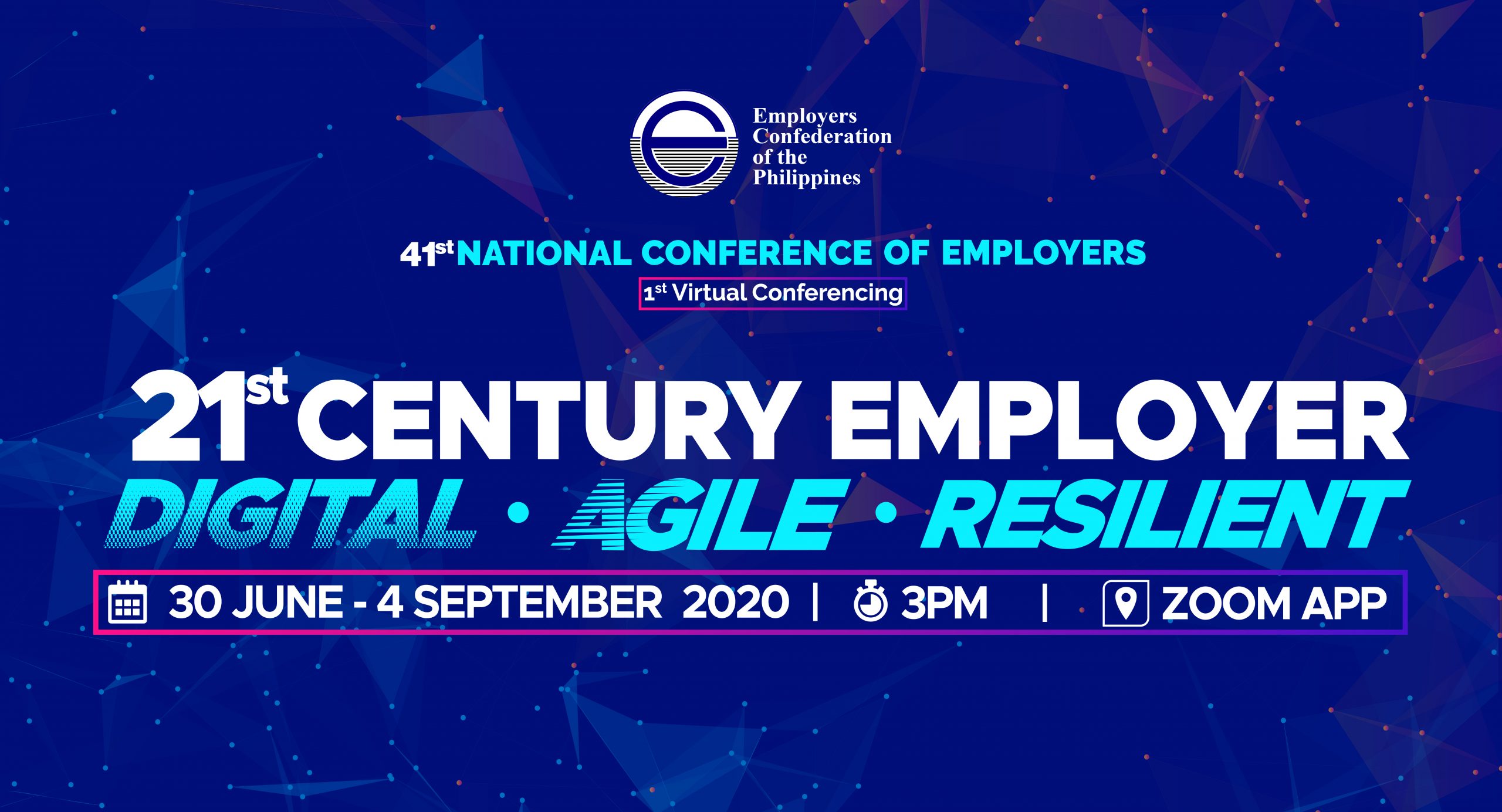
Learn more
The 41st Virtual NCE will feature four main topics focusing on (1) the Digital Employer, (2) the Agile Employer, (3) the Resilient Employer, and (4) Policy Reforms to Restart the Economy.
In addition to the abovementioned Conference sessions, the 41st Virtual NCE will also deliver pre- and post-Conference webinar sessions that will revolve around the four main topics which are designed to complement the Conference-proper topics. These pre- and post-session will run through June to July 2020 and August to September 2020, respectively.
The 41st Virtual NCE will allow participants to learn from local and international resource speakers through presentations, forums, and panel discussions. Participants will also be able to engage with our resource speakers through a moderated Q&A.
The year 2020 brought changes to the world of work and businesses were forced to adapt and adjust policies, practices, and plans. ECOP’s 41st Virtual NCE shall help prepare and equip businesses with creative approaches to respond to challenges of the future of business and work. By helping to bridge the gaps, we can encourage a new generation of employers to contribute to the economy.

| Regular Rate | GROUP RATE (min. 3 PAX) | |||
| ECOP MEMBER | NON-MEMBER | ECOP MEMBER | NON-MEMBER | |
| ALL EVENTS | Php 3,990.00 | Php 4,990.00 | Php 3,590.00 | Php 4,590.00 |
| CONFERENCE ONLY | Php 2,990.00 | Php 3,990.00 | Php 4,590.00 | Php 3,590.00 |
| Conference Proper (per episode) | Php 890.00 | Php 990.00 | Php 690.00 | Php 790.00 |
| Pre-Conference Package | Php 2,760.00 | Php 3,160.00 | Php 1,960.00 | Php 2,360.00 |
| Post-Conference Package | Php 2,760.00 | Php 3,160.00 | Php 1,960.00 | Php 2,360.00 |
| Pre/Post Conference (per episode) | Php 690.00 | Php 790.00 | Php 490.00 | Php 590.00 |
Visit this link to register: http://tiny.cc/NCE41
You may get in touch with the following contact persons for inquiries:
Ms. Mina Cacapit – 09277116177 | [email protected] Ms. Zeni Bonghanoy – 09178059471 | [email protected]

